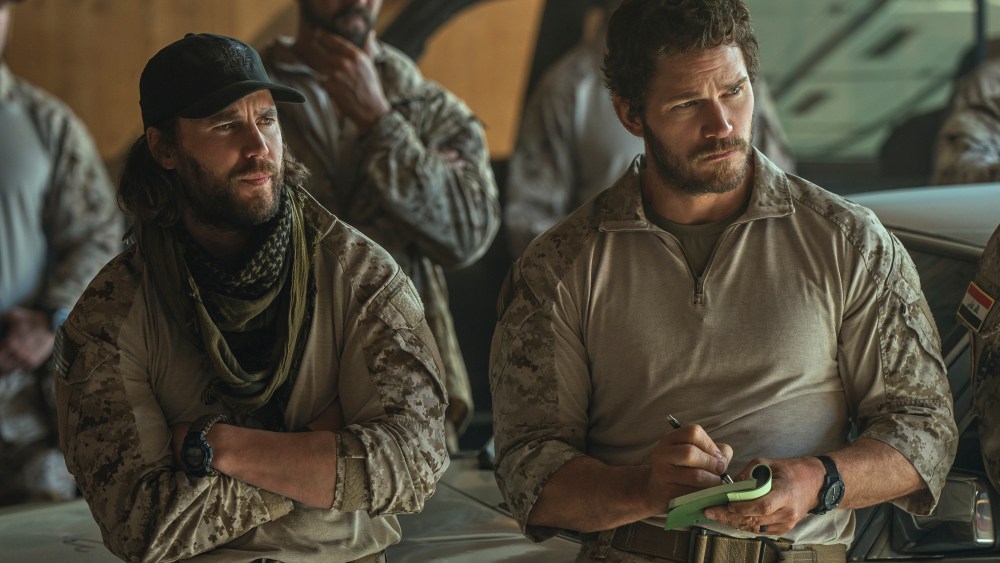‘The Terminal List: Dark Wolf’ Review: Prequel Is Macho Posturing
When “The Terminal List” prequel “Dark Wolf” stops grimly grumbling about how “bureaucrats” — the “deep state” is implied — keep “men like us” from “saving the free fuckin’ world,” it can occasionally be a half-decent action show. As the lead, Taylor Kitsch is certainly better-suited to the part of tortured warrior than the eternally bland Chris Pratt, who appears in the premiere and finale of the spinoff’s seven-episode first season to pass the baton. (Pratt continues to look like he’s concentrating very, very hard on not seeming like the type of guy who would lead the voice cast of “The Garfield Movie.”) The one extended hand-to-hand fight sequence, a showdown between a slight hacker and her much larger foe, is tense and engaging.
Unfortunately, “Dark Wolf” rarely deploys hands and fists when larger, less precise explosions will do. Likewise, the plot prefers to hammer the viewer with the simplistic image of good guy Americans versus “monsters at the door” over the finer points of geopolitical conflict. The same rah-rah boosterism powered the flagship show, based on a novel by former Navy SEAL Jack Carr, to streaming success alongside similarly muscular Amazon Prime Video series like “Tom Clancy’s Jack Ryan.” (Carr executive produces both “Terminal List” series and shares creator credit on “Dark Wolf” with showrunner David DiGilio.) Even if “Dark Wolf” achieves a similar reach, however, it will remain most valuable as a sociological artifact: a swan song for the swiftly fading era of American global leadership with some vague, perfunctory gestures at moral ambiguity.
“Dark Wolf” begins circa 2015 in Mosul, Iraq, where Pratt’s James Reece and fellow SEAL Ben Edwards (Kitsch) are training local recruits to do battle with ISIS. Military brass does not take kindly to Edwards’ summary execution of an adversary in rage-fueled retaliation for the murder of a translator. But before Edwards and his brother-in-arms Raife Hastings (Tom Hooper) — who grew up in Zimbabwe and is described, several times and with zero irony, as “Rhodesian” — can make their connecting flight from Frankfurt, they’re recruited by CIA bigwig Jed Haverford (Robert Wisdom). Haverford lures the pair in with a compelling pitch: “Things move faster over here.” To Edwards’ new boss, extrajudicial killings aren’t a disqualifier; in fact, they’re a plus.
Where “The Terminal List” sustained its revenge plot throughout as a morbid kind of organizing principle, “Dark Wolf” is first and foremost an argument for letting “defenders” on the ground do whatever the hell they want in pursuit of their larger goal. For Haverford, that goal is destroying the Islamic Republic of Iran, which at the time “Dark Wolf” is set was in the midst of hammering out a landmark nuclear deal. (Needless to say, “Dark Wolf” does not dig into the details of the JCPOA, except to imply it was foolish to ever believe such an evil, devious regime would ever negotiate in good faith.) For the mission at hand, Haverford pairs Edwards and Hastings with Mossad agents Eliza (Rona-Lee Shimon) and Tal (Shiraz Tzarfati). If recent events have made you uncomfortable with rooting for armed agents of the Israeli state, well, maybe stick to NPR.
To “Dark Wolf,” righteousness doesn’t just excuse aggression (“Sometimes it’s necessary to kill in order to protect”) or civilian collateral damage (“We need to mitigate what we can and accept the rest”), the latter effectuated through multiple armed shootouts in the middle of various European cities. (If any of them make the news, we don’t hear about it.) It’s also a reason to brush off more personal failings, like those of Landry (Luke Hemsworth, yes, Chris and Liam’s brother), a contractor prone to sexually harassing his colleagues. This tendency causes some friction, but is ultimately forgiven on account of his commitment to the cause.
There’s a general mismatch in “Dark Wolf” between the deft subtlety of a good spy yarn and the brawny machismo of the might-makes-right war pornography this show wants to be. Landry kicks off a climactic sequence by sighing, “I’d rather get some beers, but fuck it — let’s get blowed up”; Le Carré this isn’t. The story’s eventual resolution hints at some of the obvious drawbacks of empowering individual gunslingers to make decisions with far-reaching consequences. But it’s preceded by so much armchair philosophizing about “the fight,” and followed by such a total lack of consequences or lessons learned, that these elements amount to little more than a rhetorical fig leaf.
This review focuses so much on the apparent ideology of “Dark Wolf” because there’s so little to the show besides apparent ideology. Edwards has little backstory besides a fiancée back home he refuses to return to, nor much personality besides his dedication to his comrades. It’s hard for the actors to visibly emote from under so much tactical gear, though Wisdom’s natural gravitas helps elevate the lackluster material. Similarly, directors Frederick E.O. Toye (“Shōgun”), Liz Friedlander (“Fallout”) and Paul Cameron (“Westworld”) enliven the scripts where they can. The real raison d’etre of a show like “Dark Wolf” is to prop up a particular mythology: the American who makes the world a better place by following his own violent instincts. Whether the exercise succeeds as art is almost beside the point.
The first three episodes of “The Terminal List: Dark Wolf” are now streaming on Amazon Prime Video, with remaining episodes streaming weekly on Wednesdays.

